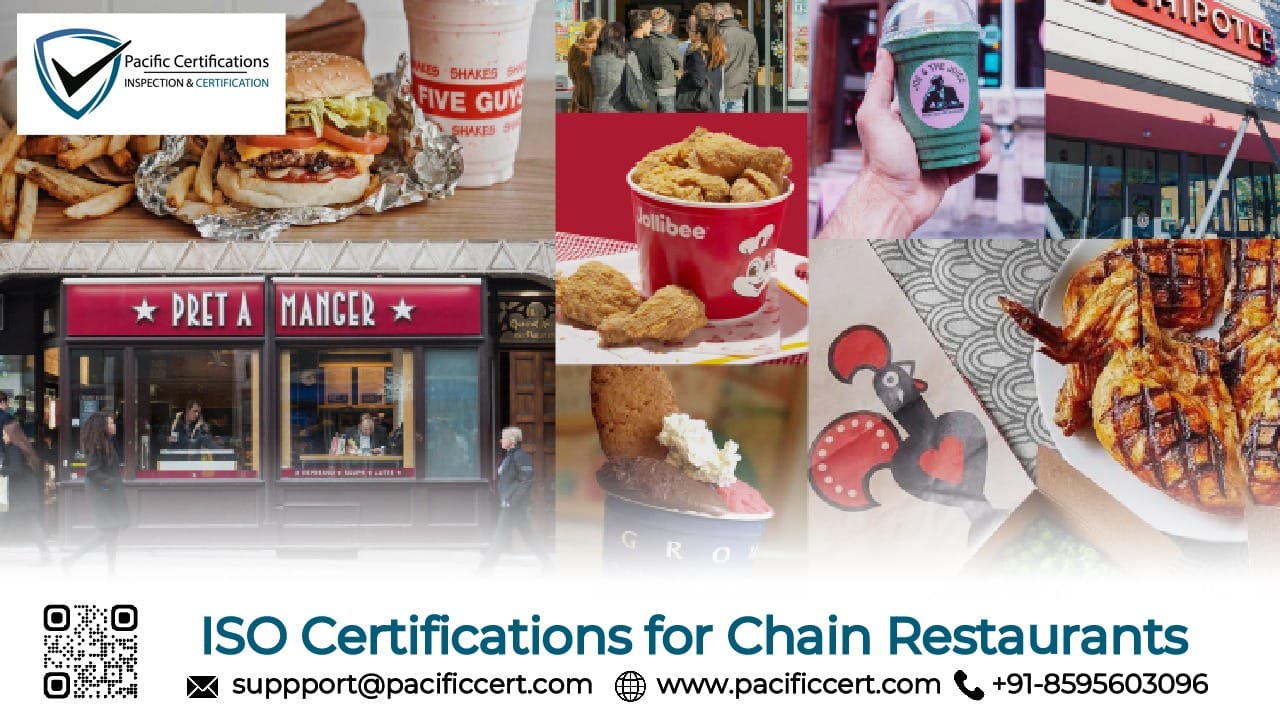ISO Certifications for Chain Restaurants Businesses, Requirements and Benefits

Introduction
Chain restaurant businesses operate in a high-volume, reputation-sensitive, and compliance-intensive environment where food safety, service consistency, hygiene control, supply chain reliability, employee safety, and brand trust directly impact customer loyalty and scalability. These businesses manage standardized menus, centralized procurement, food preparation, storage, cooking, delivery, franchising operations, and customer experience across multiple locations and geographies.
As food safety regulations tighten, consumer expectations rise, and franchise expansion accelerates, chain restaurants are under increasing pressure to demonstrate robust management systems that ensure consistent quality and safe operations at scale. ISO certifications have therefore become an essential framework for chain restaurant businesses to standardize operations, reduce food safety risks, improve efficiency, and strengthen credibility with regulators, franchise partners, and customers.
In chain restaurants, consistency is the promise—and systems are what keep it.
Quick Summary
ISO certifications provide chain restaurant businesses with internationally recognized frameworks to manage food safety through ISO 22000, service quality through ISO 9001, environmental responsibility through ISO 14001, occupational health and safety through ISO 45001, energy efficiency through ISO 50001, information security through ISO/IEC 27001, and business continuity through ISO 22301. These certifications help restaurant chains deliver safe, consistent dining experiences while supporting expansion and regulatory compliance.
For more information on how we can assist your chain restaurant business with ISO certifications, please contact us at [email protected].
Applicable ISO Standards for Chain Restaurant Businesses
Below are the most relevant ISO standards applicable to quick-service restaurants (QSRs), casual dining chains, franchise restaurants, and multi-outlet food service brands:
ISO 9001: Quality Management System (QMS)
ISO 9001 supports standardized operating procedures, recipe control, service timelines, customer handling, complaint management, and continual improvement across multiple restaurant locations.
ISO 22000: Food Safety Management System (FSMS)
ISO 22000 is the foundation standard for chain restaurants. It integrates HACCP principles with prerequisite programs to control food safety hazards related to sourcing, storage, preparation, cooking, serving, delivery, and waste handling across all outlets.
ISO 14001: Environmental Management System (EMS)
As sustainability becomes a major concern, ISO 14001 helps chain restaurants minimize their environmental footprint. It provides guidelines for energy efficiency, waste management, and resource conservation.
ISO 45001: Occupational Health and Safety Management System
Kitchen environments involve sharp tools, hot surfaces, heavy equipment, and repetitive work. ISO 45001 reduces workplace accidents and improves staff safety culture.
ISO 50001: Energy Management System
Cooking equipment, refrigeration, lighting, and HVAC systems consume significant energy. ISO 50001 helps restaurant chains reduce energy costs and improve efficiency.
Click here to find out more applicable standards to your industry
What are the Requirements of ISO Certifications for Chain Restaurant Businesses?
Chain restaurant businesses seeking ISO certification must establish and maintain documented policies, procedures, and records aligned with the selected ISO standards. Key requirements include the following:
ISO 22000:2018 – Food Safety Management Systems
Establish food safety policies and objectives
Conduct hazard analysis and implement controls
Maintain hygiene, traceability, and recall procedures
ISO 9001:2015 – Quality Management Systems
Standardize service and kitchen processes across outlets
Monitor customer satisfaction and service performance
Implement corrective actions and continual improvement
ISO 14001:2015 – Environmental Management Systems
Identify environmental aspects such as waste and water use
Implement waste segregation and reduction controls
Monitor compliance with environmental regulations
ISO 45001:2018 – Occupational Health and Safety
Identify kitchen and service-area hazards
Implement safety training, PPE, and emergency procedures
ISO 22301:2019 – Business Continuity Management
Identify critical restaurant operations and suppliers
Develop contingency plans for disruptions
Tip:Start by mapping one standard restaurant outlet—from supplier delivery and food storage to preparation, service, cleaning, and waste disposal—then replicate compliant controls across all locations.
For further information on how we can assist your chain restaurant business with ISO certifications, contact us at [email protected].
What are the Benefits of ISO Certifications for Chain Restaurant Businesses?
ISO certifications are suitable for QSR chains, casual dining brands, franchise restaurants, and multi-location food service operators. Key benefits include:
Improved food safety and hygiene controls, reducing contamination risks.
Consistent taste, service quality, and customer experience, across locations.
Enhanced compliance with food safety regulations, easing inspections.
Better waste, water, and energy management, lowering operating costs.
Safer working environments for staff, reducing injuries and turnover.
Stronger brand credibility with franchisees and customers, supporting growth.
The global chain restaurant and quick-service restaurant sector continues to expand as urbanization, delivery platforms, and standardized dining experiences grow. Industry research indicates that the global chain restaurant market is expected to exceed USD 2.5 trillion within a few years, with strong growth in Asia-Pacific, the Middle East, and Africa. At the same time, regulators are tightening food safety inspections, hygiene enforcement, and labor safety requirements.
Benchmarking shows that restaurant chains implementing structured food safety, quality, and safety management systems achieve 20–30% reductions in food safety incidents, customer complaints, and operational disruptions. ISO 22000-aligned governance is expected to become a baseline requirement for chain restaurants operating across multiple locations, franchise networks, and international markets.
How Pacific Certifications Can Help
Pacific Certifications, accredited by ABIS, acts as an independent certification body for chain restaurant businesses by conducting impartial audits against applicable ISO standards. Our role is to objectively assess whether documented management systems and restaurant operations conform to international ISO requirements, based strictly on verifiable evidence and records.
We support chain restaurant businesses through:
Independent certification audits conducted in accordance with ISO/IEC 17021
Practical assessment of real kitchen, service, and supply chain controls
Clear audit reporting reflecting conformity status and certification decisions
Internationally recognized ISO certification upon successful compliance
Surveillance and recertification audits to maintain certification validity
If you need support with ISO certification for your chain restaurant business, contact us at [email protected] or +91-8595603096.
Author:Ashish
Ready to get ISO certified?
Contact Pacific Certifications to begin your certification journey today!
Suggested Certifications –
Read more: Pacific Blogs
